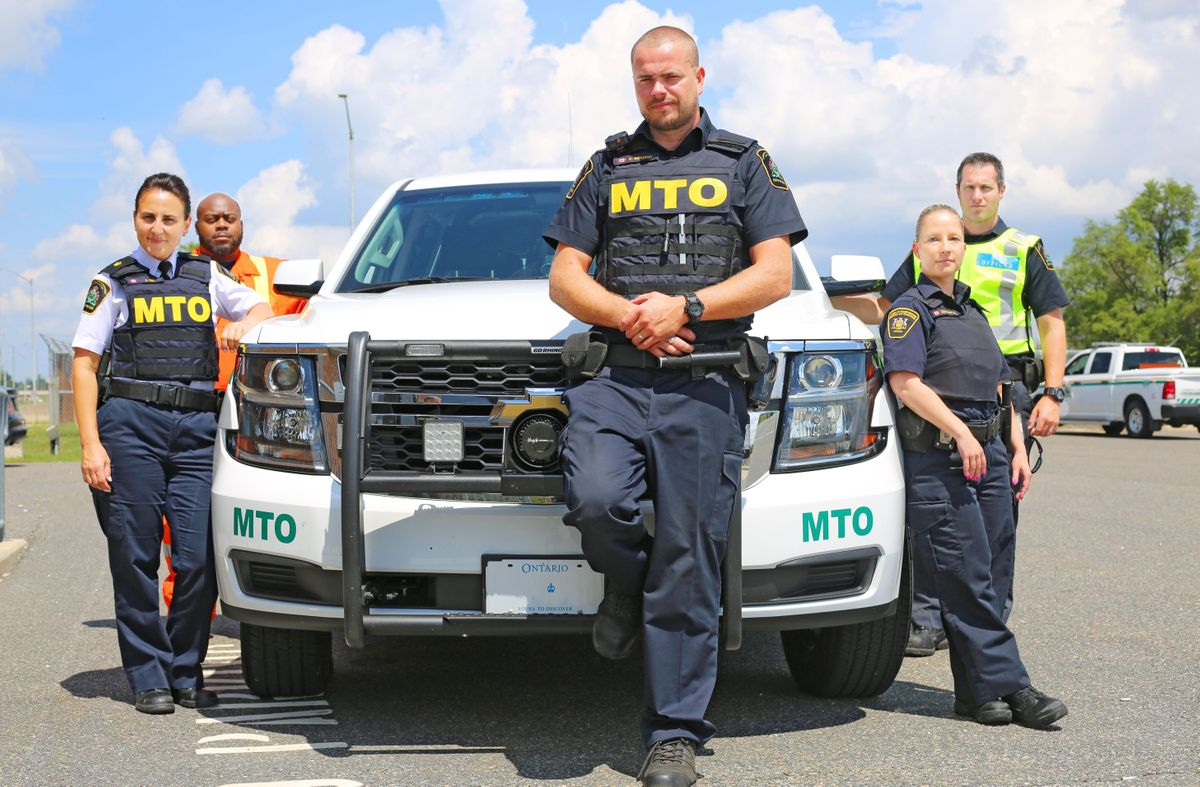Become a Transportation Enforcement Officer
Learn how to start your career as a Transportation Enforcement Officer with the Ministry of Transportation.

We are currently hiring for the following positions:
Transportation Enforcement Officer duties
Transportation Enforcement Officers (TEOs) help save lives and reduce injuries on highways in Ontario. Our officers are trained enforcement professionals with expertise in commercial vehicle safety.
Their main duties are to:
- inspect commercial vehicles, including buses, at truck inspection stations and through mobile patrols to remove unsafe and dangerous vehicles and drivers from our roads
- build partnerships and educate stakeholders to promote and improve safety and compliance
- collaborate and work with our police partners and other enforcement agencies in truck safety initiatives to ensure our roads remain the safest in North America
- conduct in depth audits on companies to ensure compliance
- inspect vehicles at the request of police, attend collisions involving commercial vehicles and conduct specialized investigations
- detain vehicles and/or loads until they are brought into compliance, issue summonses, offence notices or warnings for non-compliance
- conduct inspections and investigations of repair facilities to ensure compliance with safety inspection regulations
- participate in internationally, provincially and locally led commercial vehicle safety initiatives
- ensure compliance with provincial legislation, such as:
Eligibility
You could be eligible to be a TEO if you have:
- sound judgement and problem-solving skills
- strong communication and relationship management skills
- knowledge of interpreting and applying legislation, policy, and/or procedures
- ability to provide customer service in a fast-paced environment and to a diverse industry
- ability to successfully complete required courses and certifications
- ability to work shift work, including evenings, nights, weekends, and holidays within a 24/7 operation
- ability to work outside during periods of inclement weather in hazardous conditions
- ability to wear a uniform and required personal protective equipment including radio, body armour, handcuffs, baton and OC spray
- ability to climb on and crawl under vehicles (which may include constricted spaces) while lifting, pulling, and pushing various equipment used during vehicle inspections and weight checks
- ability to carry and use portable scales weighing up to 50lbs each
- ability to conduct duties while demonstrating self-control and professionalism in face of angry, hostile people
- a valid class G (minimum) driver’s licence
- ability to travel frequently within an assigned area, which may include travel in adverse weather conditions
- ability to obtain enhanced security clearance
Benefits of the Job
The benefits of becoming a Transportation Enforcement Officer include:
- paid training
- vacation
- health benefits coverage
- dental benefits coverage
- pension
- career advancement opportunities government wide
- Employee and Family Assistance Program
- peer support
Training
Newly hired officers complete ten weeks of basic training, and three weeks of specialized training in conducting vehicle inspections.
Training may be provided in-class or online or a combination thereof. You will be provided with all uniforms, tools and equipment you require. If your training is done in-person, you will also be provided with accommodations and meals.
You must successfully pass all exams and defensive tactics training.
Basic training includes the following topics:
- introduction to law
- Provincial Offences Act
- driver’s licence, commercial vehicle operator's registration (CVOR), registration, insurance
- defensive tactics training
- hours of service
- cargo securement
- radio communications
- trip inspection, equipment, moving violations
- lidar-based speed enforcement
- dangerous goods
- weights and dimensions
- enforcement vehicle operations/driver training
- practical scenarios
- court room proceedings
- mock court scenarios
How to apply
Transportation Enforcement Officer jobs are posted on the Ontario Public Service Careers website
You can sign up to join a mailing list to be notified of upcoming job openings and other related information.
Getting a job as a Transportation Enforcement Officer is very competitive. Your application and cover letter will be reviewed and scored based on the qualifications described in the job posting. Only top scoring applicants are invited to an interview.
If you are invited to an interview, the selection panel will require three references and authorization to conduct background checks.
How to complete the application form:
Once you’ve reviewed an open job posting, you can apply online using a form. You do not need to submit a resume or cover letter.
If you require a disability-related accommodation in order to apply, please contact us.
Tips:
- All information that you want us to consider should be stated clearly, and in detail in your application form. No assumptions will be made in this assessment process.
- Make sure to complete the “location preference” sections of the application form. The job ad lists the work locations and number of positions available at each location. Only select the locations that you would accept, if offered.
- Section 7 of the application form will ask you to demonstrate your knowledge, skills and experiences in each of the listed competencies. You will be scored on how well your responses and relevant examples meet these requirements. Simply answering "yes" to each of the questions is not an acceptable response.